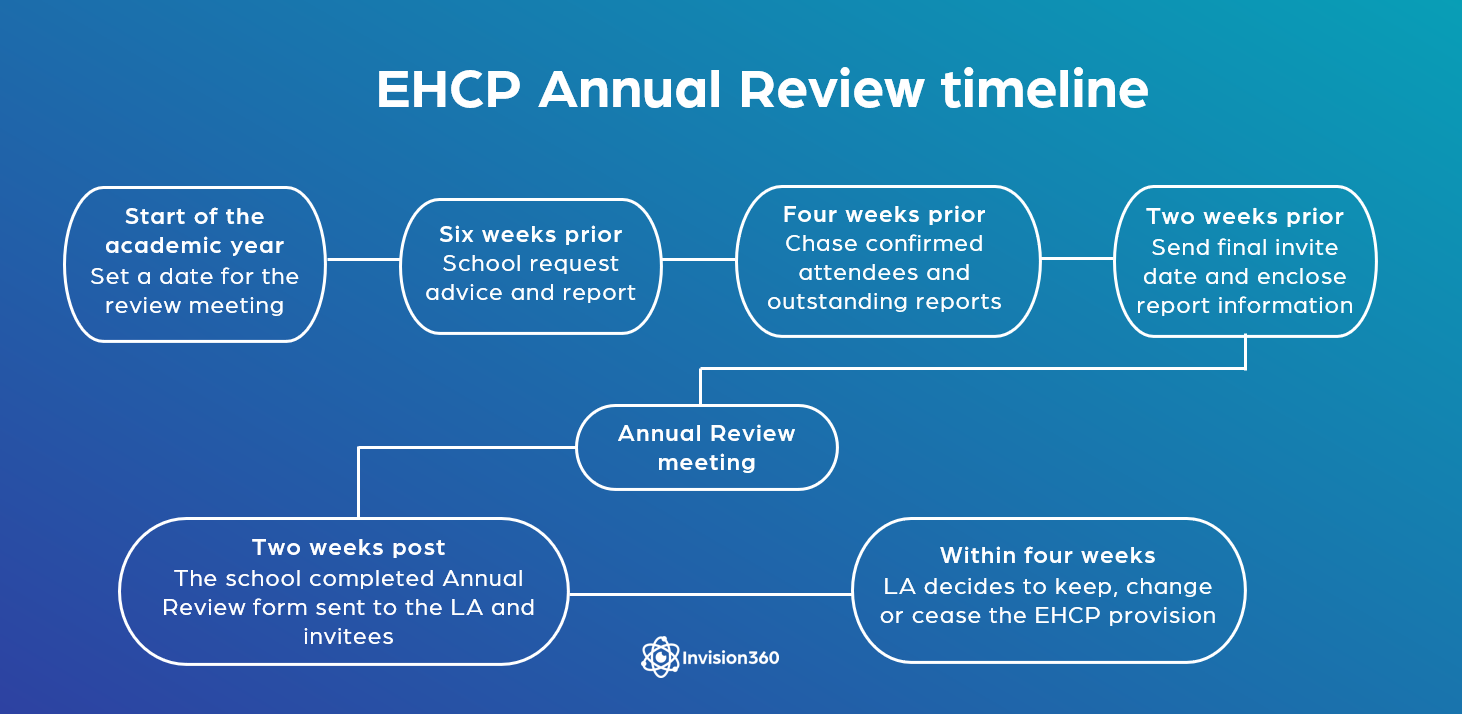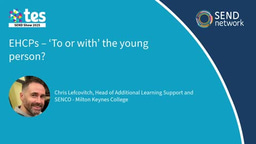Why is an effective Annual Review process essential to running an effective SEND team?

EHCP Annual Reviews fall under the statutory requirement of the Local Authority (LA). With the LA SEND team’s caseloads fit to bursting, EHCP Annual Reviews can bring some pretty hefty amendment paperwork.
So, why do them?
This article explains why an effective Annual Review process is essential to running a cost-effective SEND team. By touching on the common challenges your SEND team will face, you’ll find out how to improve your EHCP Annual Review process.
We cover why the EHCP reviews happen, how the process works and an EHCP Annual Review timeline detailing when each stage in the EHCP review process happens.
What is an EHCP Annual Review?
An EHCP Annual Review must happen at least once every 12 months. The purpose of the EHCP review is to do just that: review.
Each aspect of the Education Health Care Plan is reviewed to assess its suitability and discuss one of three possible outcomes of the meeting:
- Continue with the same EHCP provision
- Amendment aspects of the EHCP to fit evolving needs
- Cease the EHCP
The Annual Review meeting is organised by the child or young person’s school (a delegated duty task from the LA). All involved services from education, health, and social care are invited to attend the meeting, along with the child or young person and their parents/carers, to discuss progress and decide on the next steps.
As with the whole EHCP process, it is essential to collect feedback directly from the child or young person. The child-centred approach set out in the SEN Code of Practice 2014 underpins all stages of the EHCP process, especially the creation and review stages.
“The Annual Review Tool enables our SEND case workers to better manage their time, and so there’s an overarching feeling that everyone is supported.”
Rebecca Farrell, SEND Quality Improvement Officer, Knowsley Council
Why do EHCP Annual Reviews happen?
A child or young person’s needs can hugely change in education, health, or social care within 12 months.
EHCP Annual Review meetings bring all involved professionals together at the same time to evaluate whether the current EHCP meets the child’s SEND needs.
Local authorities have a statutory requirement to ensure an Annual Review is undertaken. This legal duty is set out in The SEND Code of Practice 2014 and The Children and Family Act 2014.
An effective EHCP Annual Review process means:
- Children and families are kept at the heart of the EHCP process
- SEND provision is tailored to the child or young person’s needs
- The EHCP remains adaptable to evolving needs and ambitions
- Local Authority SEND teams can meet ambitious EHCP deadlines
- High-quality communication between services
Did you know you can use our EHCP Annual Review Tool alongside the popular EHCP Quality Assurance Tool? These tools complement each other in assessing the quality of the entire EHCP process, from initial creation to annual reviews.
What happens at an EHCP Annual Review?
The EHCP Annual Review process has four main steps.
1. Preparation and Notification
Before all involved parties are notified of the EHCP Annual Review date, the first step is to coordinate the EHCP review with any planned social care reviews with named social care professionals.
The review date will be at least four weeks before the 12-month anniversary of the EHCP creation date. Invites will be sent to all involved in the EHCP review at least six weeks before the planned meeting date.
The professionals invited to the meeting have 2-weeks to confirm their attendance and send any relevant reports, evaluative information or evidence of the EHCPs progress to the school (as the school SENDCo will most likely be organising the meeting).
A final meeting invite contains the reports from all professionals and feedback from the child and their family. This invite will be sent out two weeks before the EHCP review meeting.
2. EHCP Annual Review Meeting
The meeting will often take place in the child’s school (there may be a virtual attendance option). It will focus on the child’s progress in meeting the previously agreed EHCP outcomes and consider whether they are suitable for meeting the needs, feelings, and views of the child and their family.
What are parent’s contributions in an EHCP Annual Review?
The views and feelings of the child and their parents will be gathered before the Annual Review meeting. The EHCP review process should be child-centred. the child or young person does not have to attend EHCP Annual Reviews, every effort should be made to gather their thoughts before the meeting and share on their behalf if this is the case.
3. EHCP review report created
The school SENDCo will create a review report (this is within 2-weeks of the meeting). The review report will include any recommended amendments to the EHCP discussed during the meeting. All invited parties will receive a copy of this report.
4. The Local Authority EHCP review decision
LAs have four weeks to decide on the proposed EHCP amendments. The decision will be to keep the EHCP as it is, amend it, or cease it. Parents have 15 days after the decision is given to appeal via tribunal.
When the amendments are agreed upon, the Local Authority has an 8-week deadline to return a final amended EHCP to the family and school.
The EHCP Annual Review timeline
Knowing the projected EHCP Annual Review timeline can be useful. We have included the expected timeframes local authorities aim for. The challenges surrounding EHCP creation timeframes are well-known, and the EHCP Annual Review process also experiences delays.

If amendments are agreed upon, draft EHCP is issued, and parents have 15 days to respond
When changes are agreed on, LA has eight weeks to get the final amended EHCP done (parents can appeal if they don’t agree with the final EHCP)
Challenges Local Authorities face with EHCP Annual Reviews
Local Authority SEND teams are working with an unprecedented number of EHCP cases. The challenges surrounding EHCP creation deadlines are well-known. Delays with amended EHCPs following an Annual Review are less documented.
The Volume of EHCPs to Review
Without AI technology to help the EHCP process, manually creating and reviewing many EHCP against tight deadlines is a challenging task for the most organised SEND Team.
Collection of Child and Family Feedback
As the process centres around the child or young person, gathering honest feedback is essential to drive the Annual Review discussions. Children and young people can be reluctant to share their feedback on their EHCP provision, making collecting high-quality data consistently for each case challenging.
Auditing the Annual Review Process
SEND Teams’ efficiency relates to deadlines achieved and the quality of the EHCP created. Auditing the Annual Review process can focus only on broad metrics, such as the number of amended EHCPs completed within the timeframe. For the auditing process to be effective, SEND Team Managers must have complete visibility of their team’s current cases. Having access to insights and data on the current case progress status helps with the auditing process.
Did you know you can benchmark your LAs EHCP Annual Review efficiency against other Local Authorities with Invision360?
Learn more about our EHCP Annual Review Tool.
How Invision360 can help
We’re known for our industry-leading tools to help improve your SEND Team’s efficiency. From the creation of EHCPs, quality assurance of healthcare professional advice and the review of the EHCP, we have a tool to streamline your process.
“Looking back, when we first introduced the tool, it was the first time that we could truly monitor outcomes. The Annual Review Tool is invaluable in supporting us in changing our processes.”
Rebecca Farrell, SEND Quality Improvement Officer, Knowsley Council
Want to see if Invision360’s EHCP Annual Review Tool is a good fit for your Local Authority? Get in touch with our team to book your free demo.
More articles you’ll like:
New Invision360 EHCP auditing service launches
Continuing professional development in the SEND sector
Setting good EHCP outcomes: how to write outstanding section e EHCP outcomes every time





Please sign in or register for FREE
If you are a registered user on SEND Network, please sign in